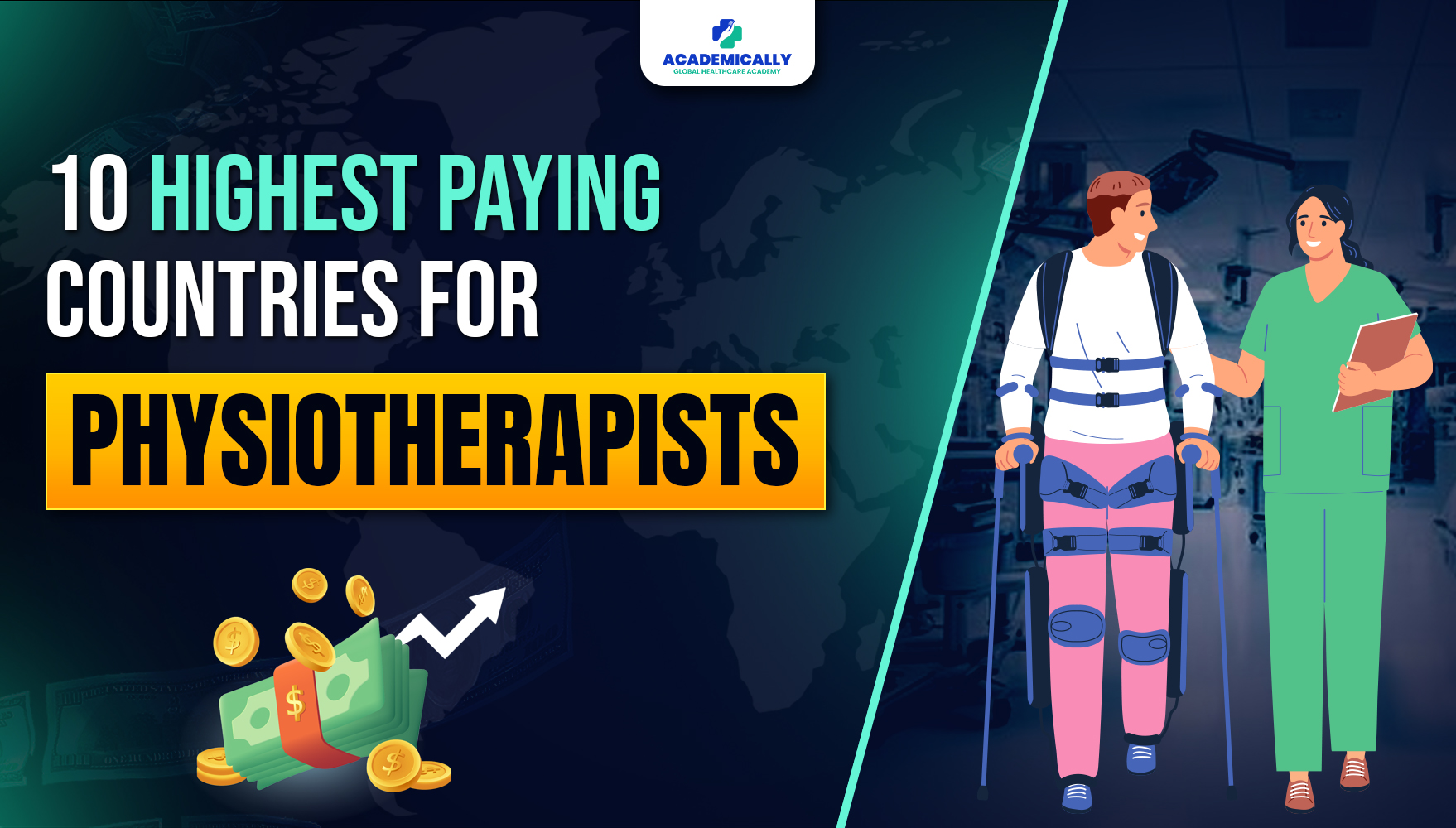1. Australia
Australia strikes a great balance between good pay and a great lifestyle. Think outdoor weekends, great salary, and a reliable healthcare system for you and your family.
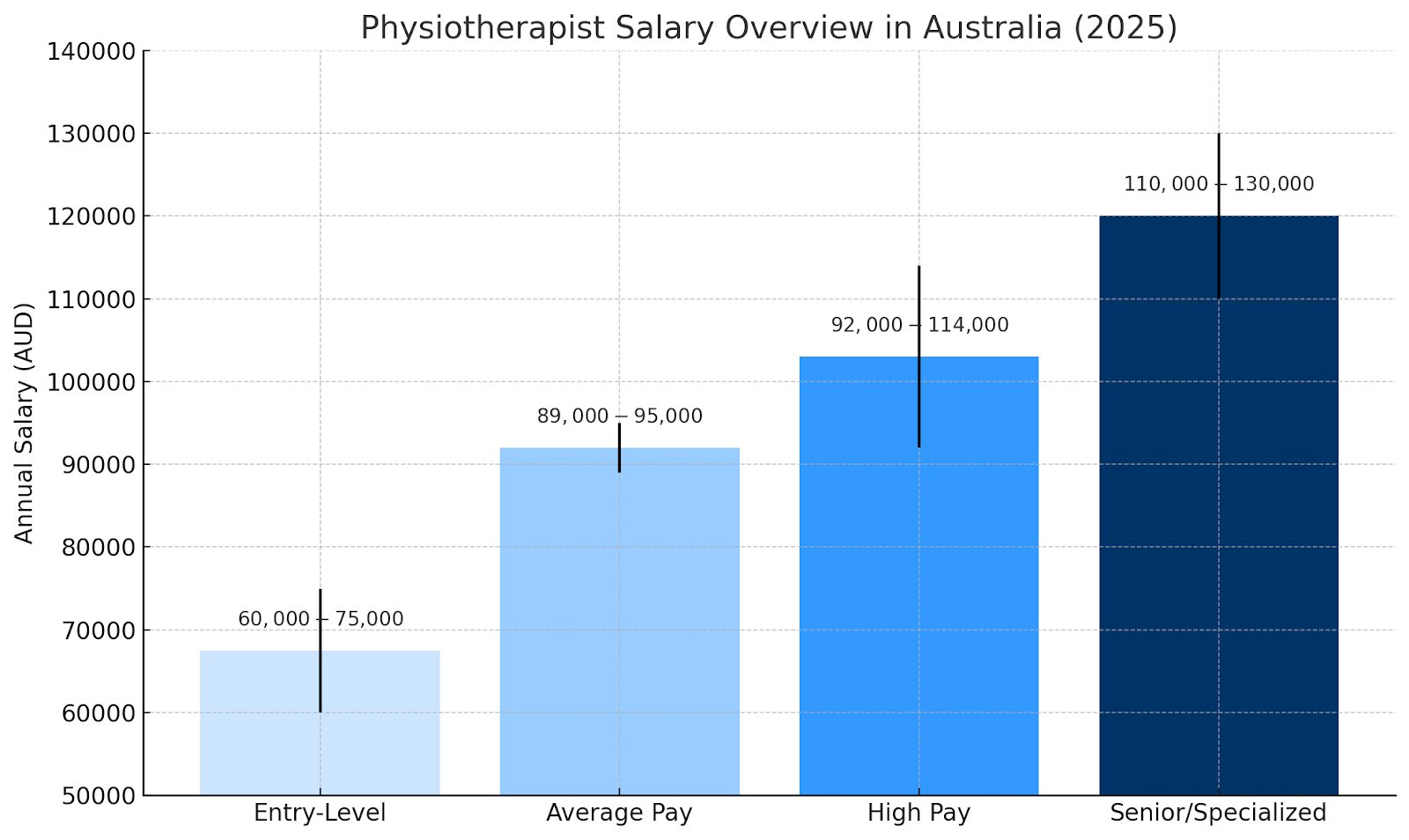
- Average pay: AUD 89K (₹4,990,325) - 95K(₹5,325,470) annually
- High pay: AUD 92K (₹5,157,297)/year, including base pay of AUD 75K (₹4,204,318)–95K(₹5,325,470) and AUD 3K(₹168,172)–19K(₹1,065,094) in extras.
- Entry-level pay: AUD 60K (₹3,363,454) –75K (₹4,204,318) , while senior or specialized physiotherapists can move well past AUD 110K (₹6,166,333) , especially in private practice, elite sport, or education.
That sums it up: stable and in-demand. Australia also has a fast visa processing system compared to other countries. You can learn about the process, and our experts can guide you through the whole pathway.
Academically is the expert in preparing candidates for the Australian Physiotherapist Council (APC) Exam for years. Enroll in our preparation course and connect with our team of veteran doctors and educators to get the best possible guidance for AMC exam preparation.
2. Switzerland
Switzerland is home to some of the highest salaries on the planet for physiotherapists. Here's the full scoop:
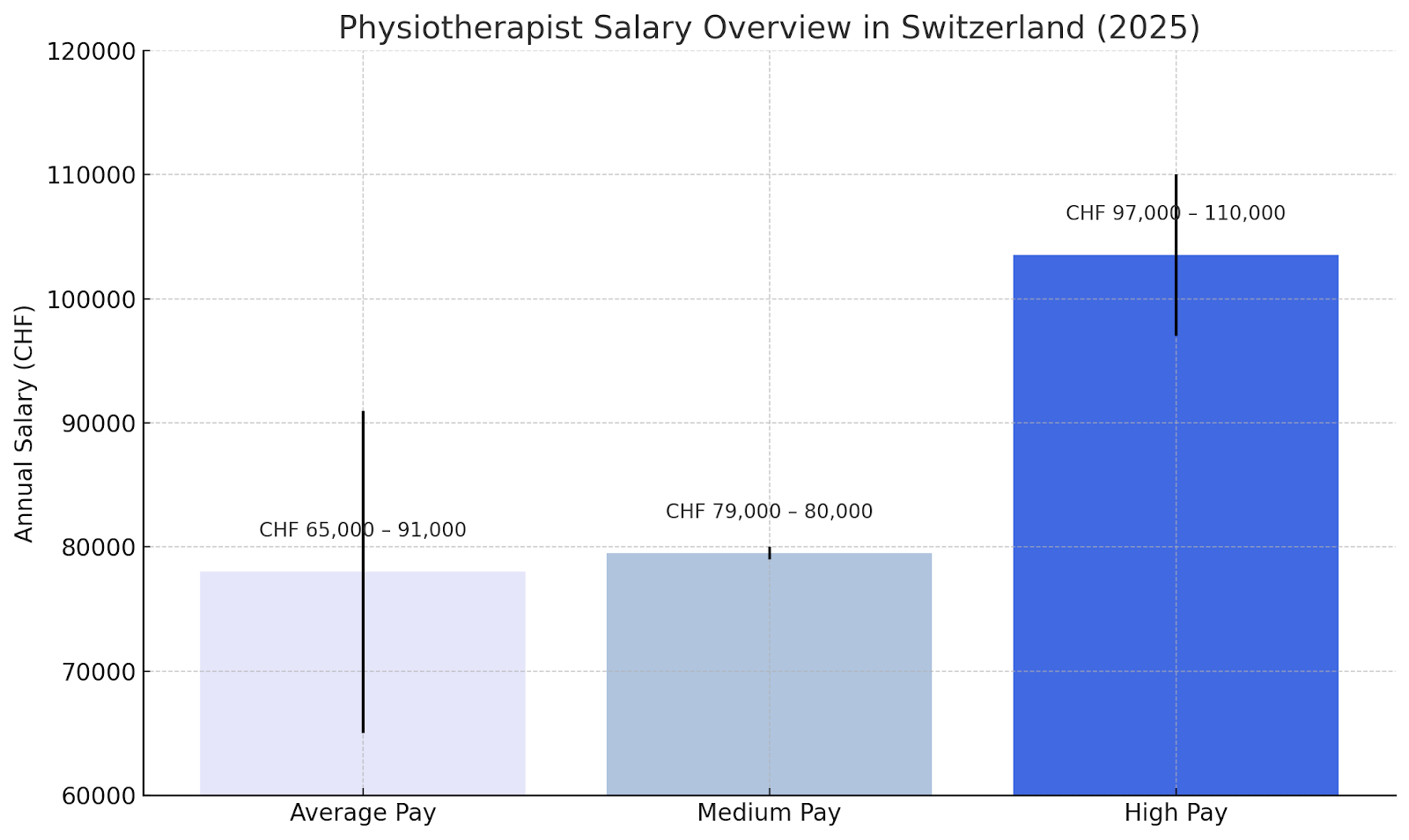
- Average pay: CHF 75.5K ( $84K) (₹8,140,002)with total pay ranging from CHF 65K (₹7,007,949)–91K(₹9,811,128) including bonuses
- Medium pay: CHF 80K(₹8,625,168) to CHF 79K(₹8,517,353), with top earners reaching CHF 90K(₹9,703,314)–95K(₹10,242,387).
- High pay: CHF 97K(₹10,458,016)–110K(₹11,859,606).
The earning potential for physiotherapists isn’t just in the headline CHF figures; it’s in potential savings, healthy work-life balance, and being part of a top-tier healthcare system.
3. United States
If you are considering your options internationally, then the U.S. is the one that stands out the most. Physiotherapists make more than $ 100K/year, and with good experience, their salary can increase a lot. Here's the breakdown:. Here's the breakdown:
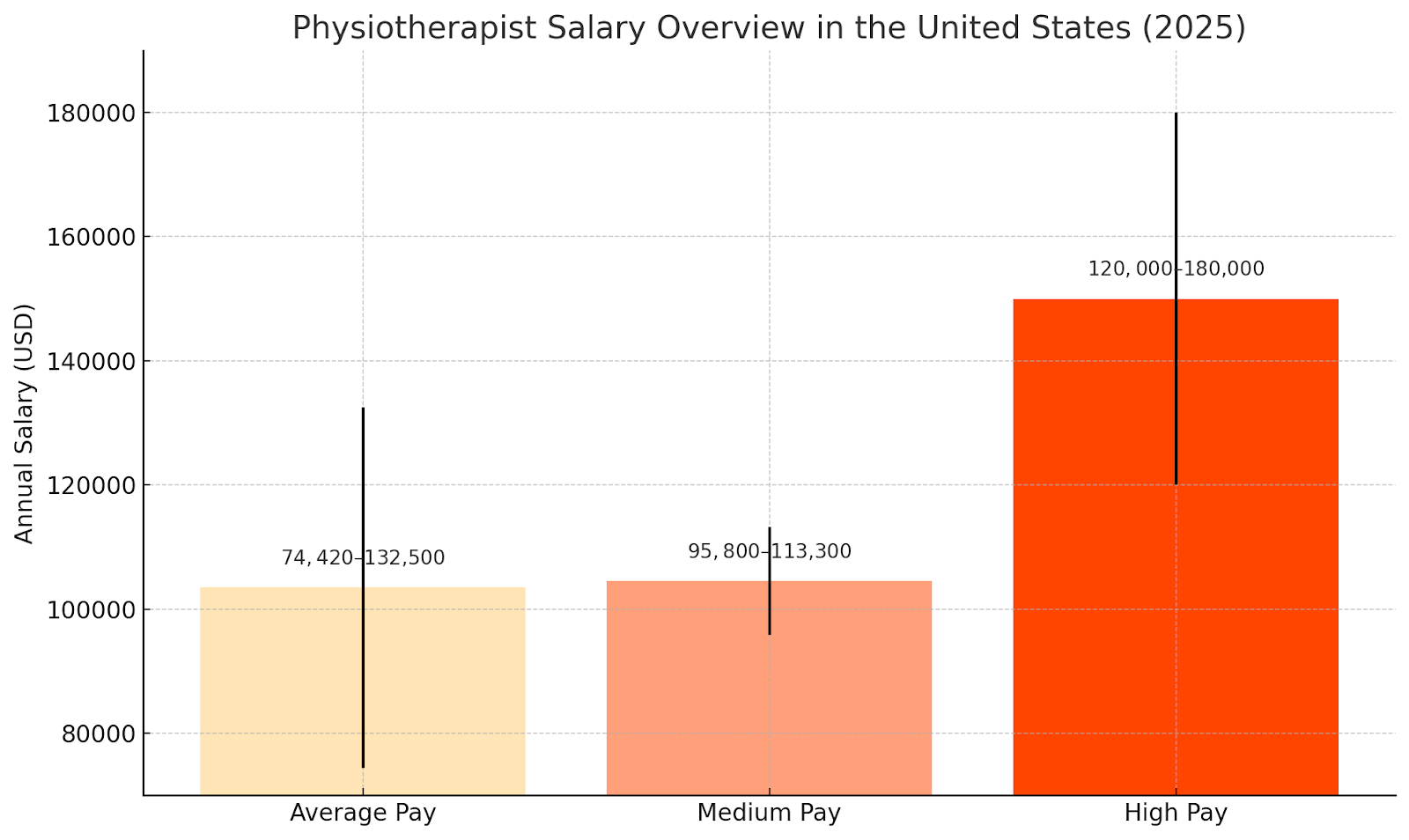
- Average pay: The latest American Labor Statistics Bureau shows an average annual salary of $101K (₹8,646,589) in May 2024, for top 10% $132K (₹11,300,493) and below 10% $74K (₹6,335,125) annually.
- Medium pay: $104K(₹8,903,419),between $95K(₹8,132,931)–113K(₹9,673,907) annually .
- High pay: $120K(₹10,273,176) - $180K(₹15,409,764) annually
The best place to work in the U.S
- San Francisco: $172K(₹14,724,885), base pay $146K(₹12,499,030) and about $20K(₹1,712,196) additional as bonus.
- California overall usually ranks in the top five U.S. states, with an average physiotherapist's salary above $114K(₹9,759,517).
The $100K(₹) baseline is real, backed by government data and peer review. Location matters: urban hubs and specialized settings like home health can push earnings to $150K(₹)–170K(₹)+ annually.
If you are planning to start your career as a physiotherapist in the U.S., our team can guide you with the best career pathway. You can book a counselling session with our experts and receive a call back in the next few hours.
4. Canada
In Canada, physiotherapy salaries are really great, and whether you go for the public (hospital) route or private/contractor roles greatly impacts your earnings. Here's a detailed breakdown:
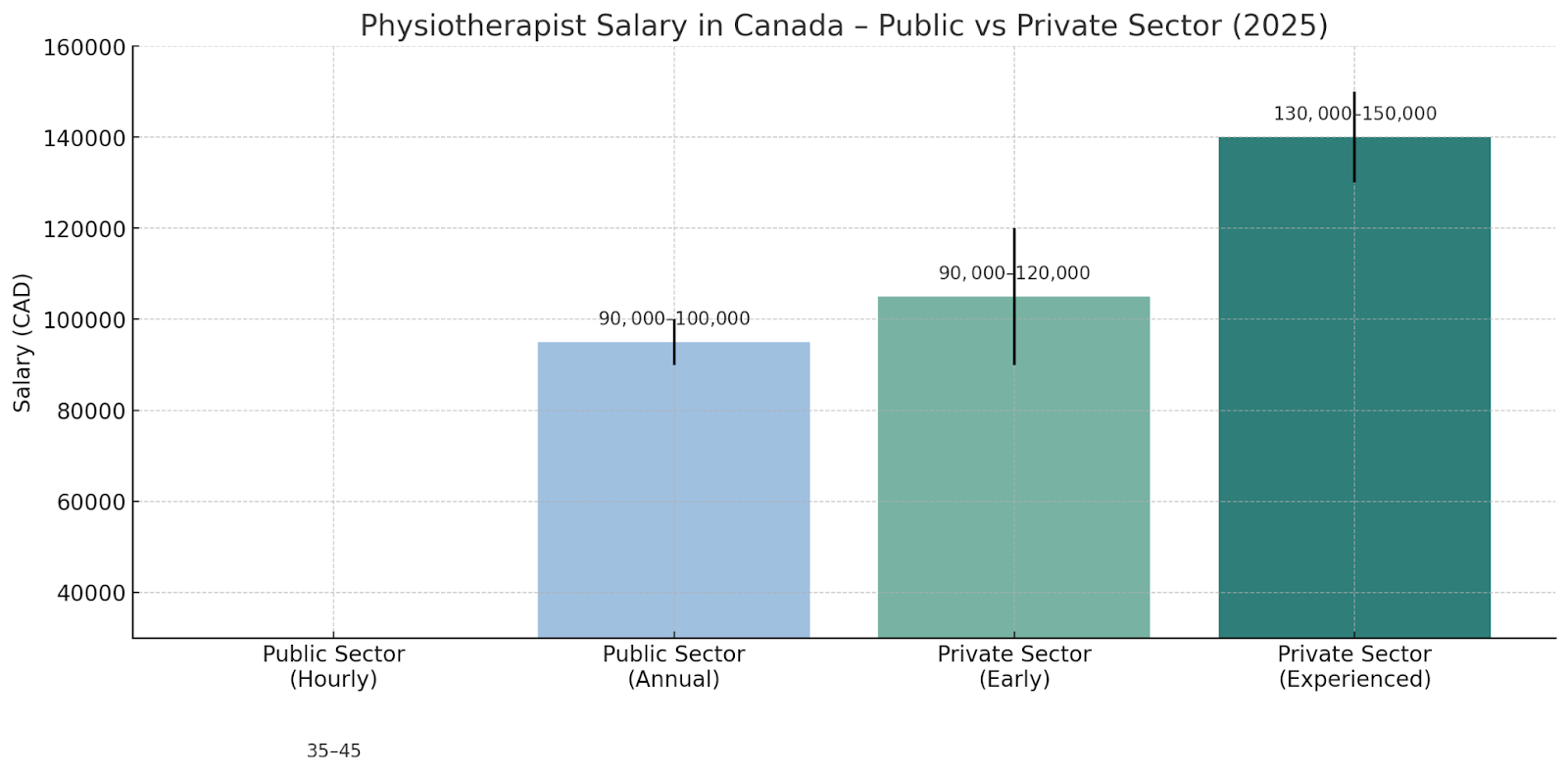
Hospitals & Clinics (Public Sector)
- Average pay: Hour rate CA$35(₹2,190)–45(₹2,815)/hour
- Average pay: CA$90K(₹5,631,538) - 100K(₹6,257,265) annually
- Median hour rate: CA$44(₹2,753) - CA$52(₹3,253)/hour is the standard pay in Canada.
Private Sector (Contractor or Fee‑Split Model)
- Contractors often earn CA$90K(₹₹5,631,538)–120K(₹6,257,265)/year once their caseloads pick up
- Experienced private practitioners in BC or Alberta report incomes between CA$130K(₹8,134,444)–150K(₹9,385,897)+, working 35–40 hours per week
Canada offers a strong baseline for physiotherapists in the public sector, with benefits and stability. And if you're an entrepreneur and manage a private practice, especially under a fee-split model, it can lead to substantially higher earnings.

5. Germany
Germany is dependable for physiotherapists who value stability and good social benefits. But here’s the reality: salaries are more modest than in some other countries. That said, with the right setting, it’s a rewarding and structured career path.
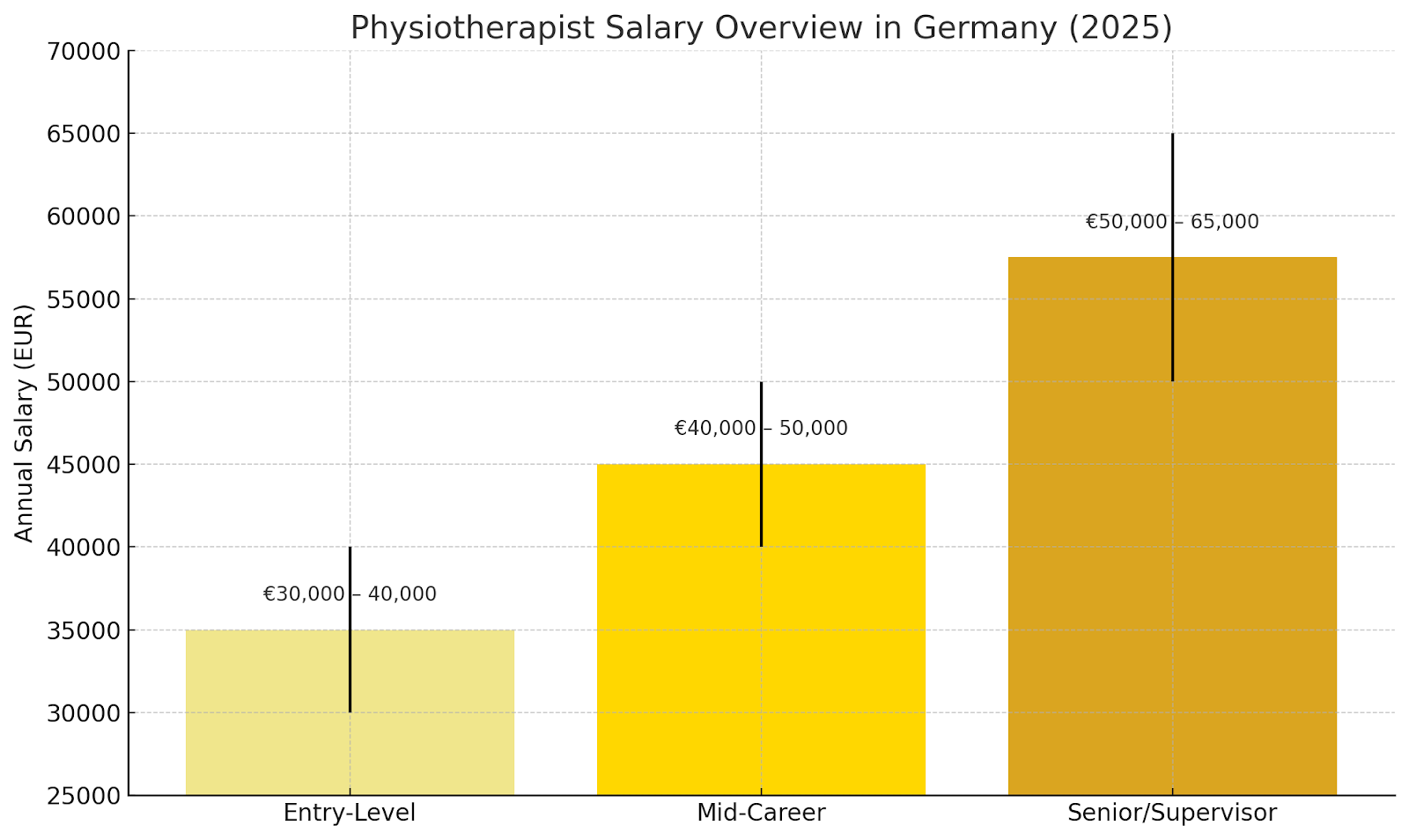
- Basic pay: (0–3 years): €30K(₹3,013,380)–40K(₹4,017,840) annually
- Medium pay: (4–7 years): €40K(₹4,017,840)–50K(₹5,022,300) annually
- High pay: €50K(₹5,022,300)–65K(₹6,528,990) annually
Germany is ideal if you want a reliable job, strong social security, and clear progress. But if you are targeting higher income, the path is either opening your clinic or transitioning into private/independent practice. Additionally, language proficiency is a requirement (German B2+ is a must).
6. Netherlands
The Netherlands offers physiotherapists a steady income with good prospects, the reason it is not one of the top-earning countries; the pay is average unless you are into private practice or specialization.
Salary by Experience
Netherlands salaries evolve clearly with experience:
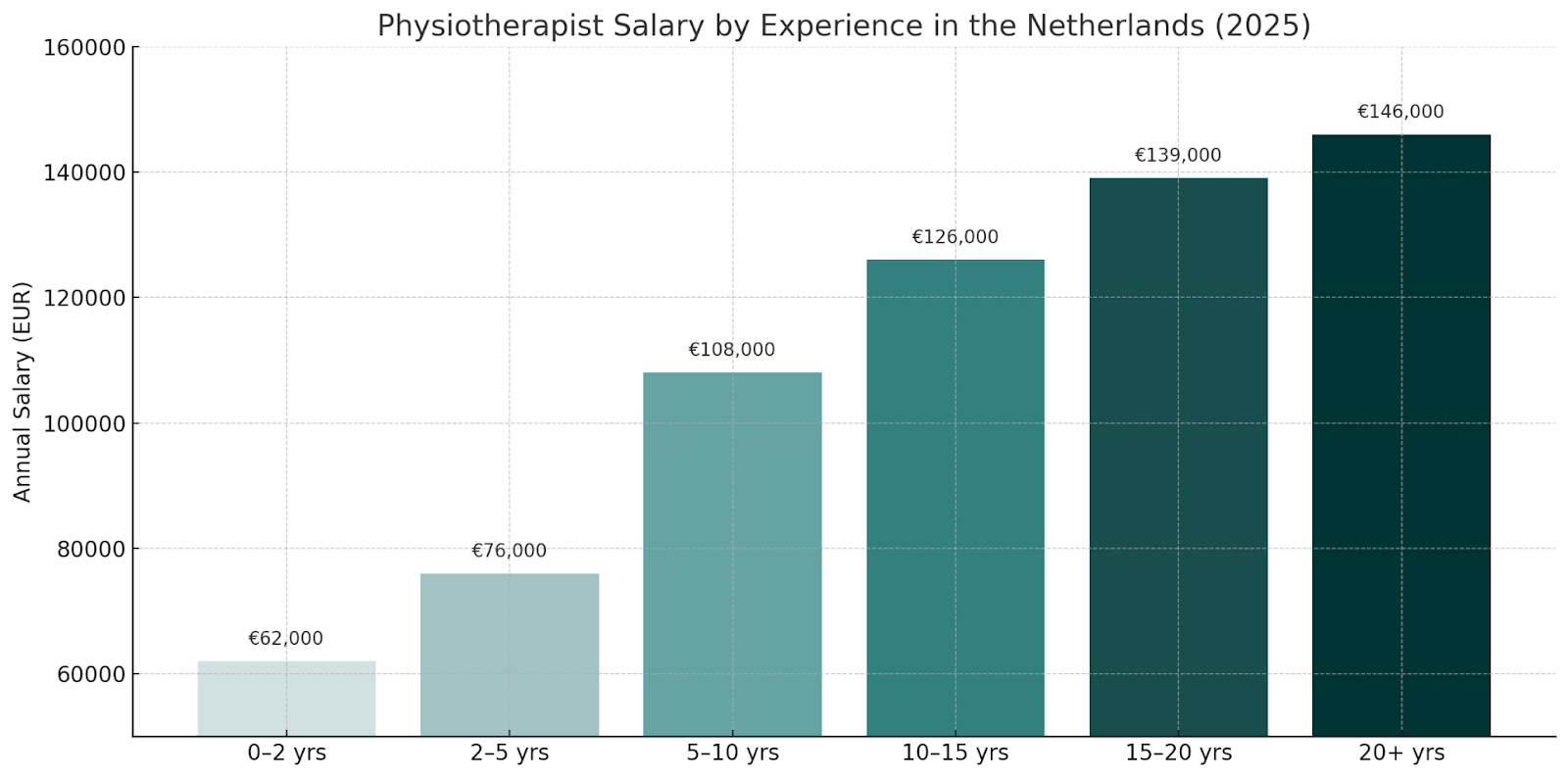
- 0–2 years: €5,170/month (€62K/year) (₹6,226,970) annually
- 2–5 years: increase to €6,350/month (€76K/year; +23%) (₹7,633,060) anually
- 5–10 years: rises further to €9,000/month (€108K/year; +42%) (₹10,846,980) annually
- 10–15 years: climbs to €10,500/month (€126K/year; +17%) (₹12,654,810) annually
- 15–20 years: €11,600/month (€139K/year) (₹13,960,465) annually
- 20+ years: caps around €12,200/month (€146K/year) (₹14,663,510) annually
A bachelor’s degree nets €5,680(₹570,470)/month, a master’s jumps to €9,040(₹907,932), and a PhD can push it to about €11,700(₹1,175,089)
The Netherlands is a good choice for physiotherapists seeking a stable, structured career with a good work-life balance. Base pay is average but not outstanding; success depends on advancing your career, and credentials, and perhaps embracing private practice. Just go in knowing: Dutch fluency and entrepreneurship open the doors to much higher earnings.
7. Ireland
Ireland provides physiotherapists a dependable, good salary and great public health benefits, but the cost of living is generally high in cities like Dublin can impact the overall savings. Here’s a breakdown:
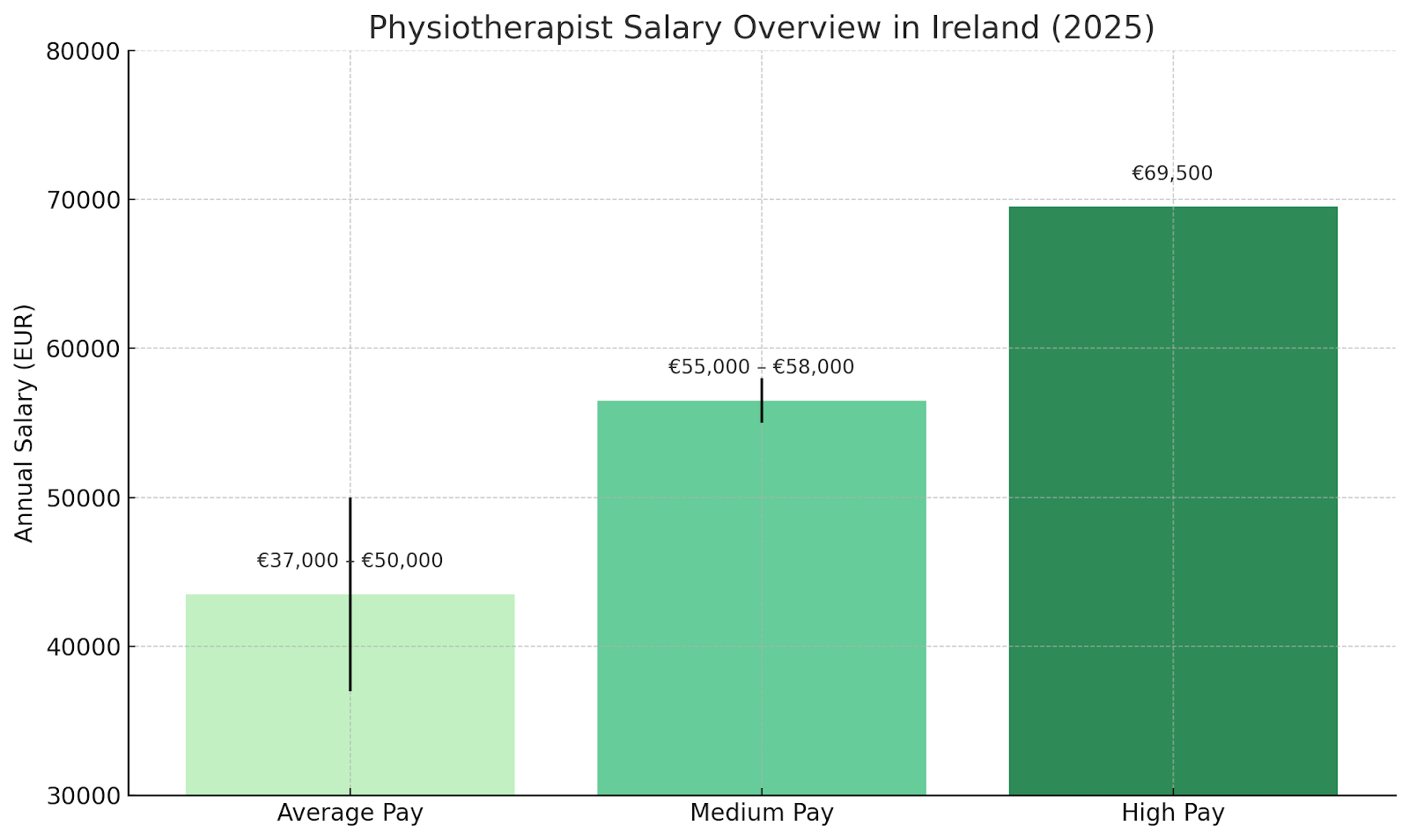
- Average pay: €37K (₹3,716,095) - 50K (₹5,021,750) annually
- Medium pay: €55K(₹5,523,925) - €58K(₹5,825,230) annually
- High pay: €69.5K(₹6,980,232) annually
Ireland provides a clear pathway for physiotherapists, with career progression and strong public benefits. Total compensation usually sits between €55K (₹5,523,925) - 77K(₹7,733,495) annually, it’s higher in Dublin or senior roles.
8. Norway
Norway is one of the most rewarding countries for physiotherapists in terms of salary and work-life balance. If you are fluent in English and ready to go long-term, it's one of the most attractive destinations in Europe. So, what does Norway demand? You’ll need Norwegian fluency and licensing to get through the Norway physiotherapist's career door.
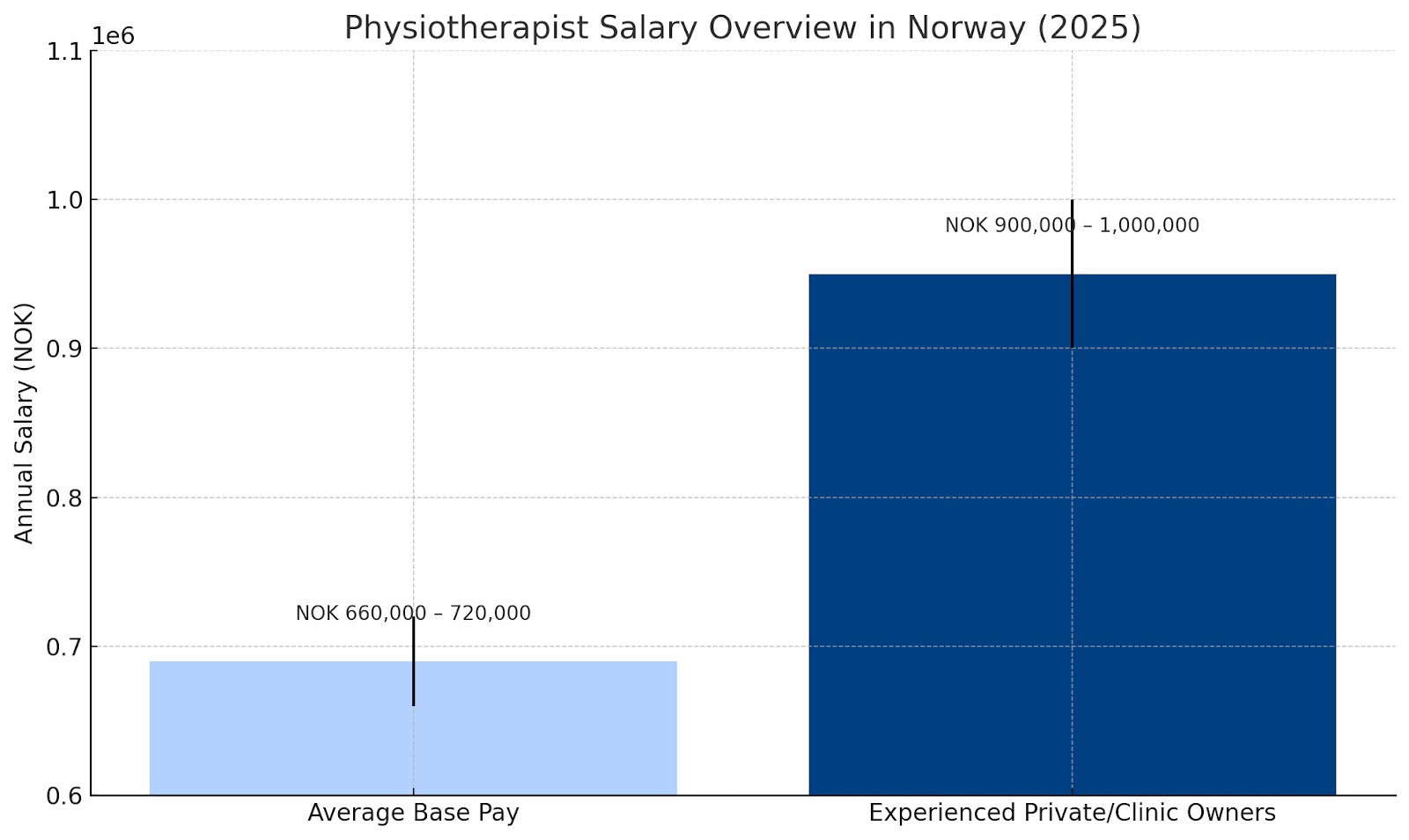
- Average base salary: NOK 660K(₹5,599,947) – NOK 720K(₹6,109,033) annually
- Hourly pay: NOK 340(₹2,884) –400 (₹3,393)/hour, which is among the highest in Europe
- Experienced private physiotherapists or clinic owners can make over NOK 900K (₹7,636,292) –1,000K (₹8,484,769) annually
Norway stands out for physiotherapists who prioritize quality of life, strong hourly wages, and autonomy. Whether you’re in a part-time role or full-time independent practice, the income potential is high, but only once you clear the licensing, language, and HELFO hurdles.
9. New Zealand
New Zealand offers a relaxed work culture, scenery, and work-life balance, making it a clear winner. Salaries are decent, especially in private practice or with specialization, but the living costs are high if you are not careful with your savings.
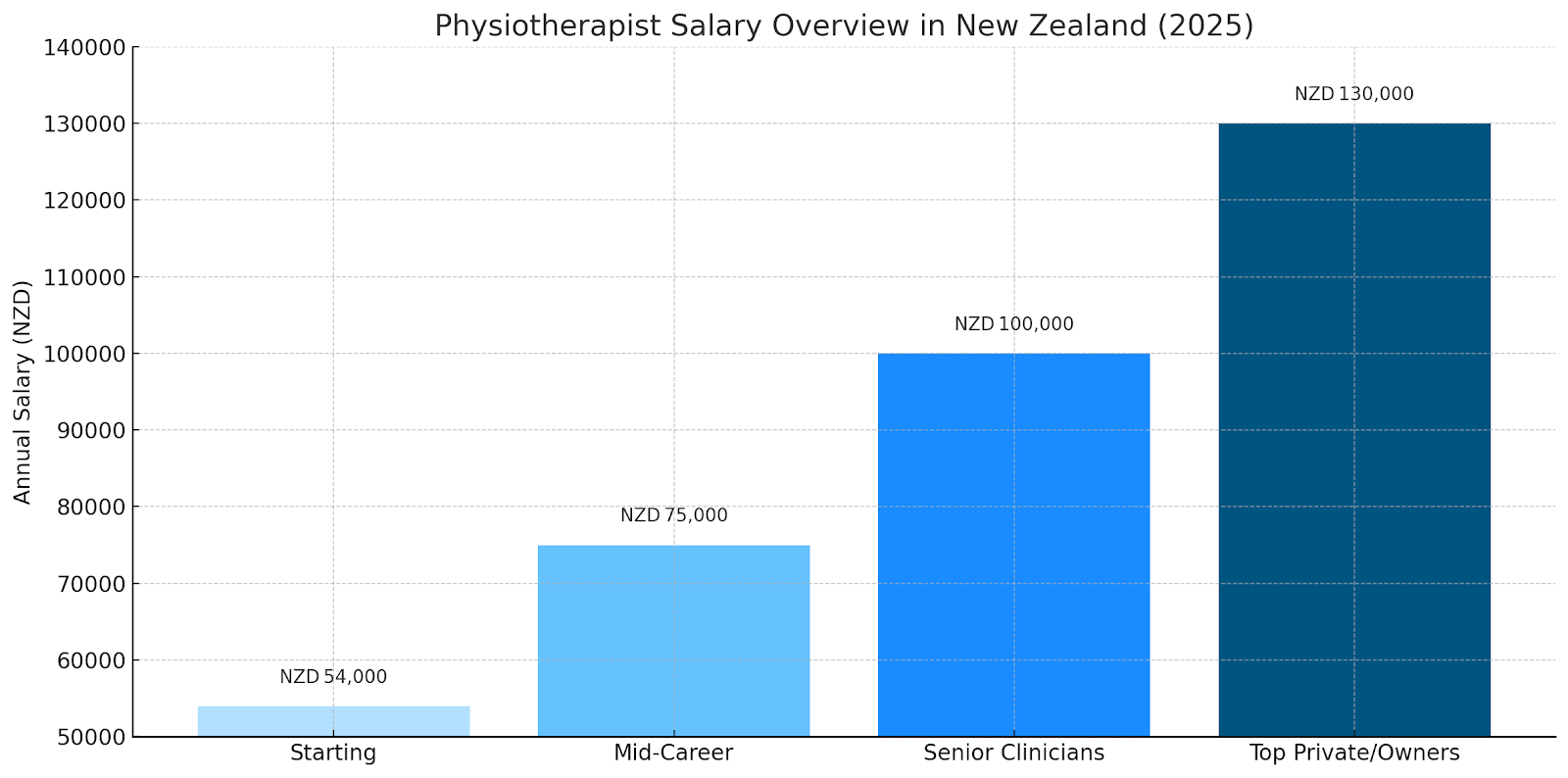
- Average pay: NZD 54,000 (₹2,775,368) - NZD 60,000(₹3,083,742) /year, mostly in public hospitals
- Medium Pay: NZD 65,000 (₹3,340,721) - NZD 85,000 (₹4,368,635) annually with around 3-6 years of experience.
- High pay: NZD 90,000(₹4,625,613) - NZD 110,000(₹5,653,528)/year, especially in high-demand specialties like neuro or musculoskeletal rehabilitation.
- Independent practitioners or clinic owners: NZD 120K(₹6,167,485)+, and it mostly depends on the region.
New Zealand offers physiotherapists a stable, satisfying career, especially if you want a work-life balance. If you climb the ranks or go private, there’s room to earn well. But even at baseline, it’s a good place to work and live, if you like peaceful work environments.
10. United Kingdom
The UK might not be at the top of the salary charts for physiotherapists in 2025, but it provides the value of some healthcare professionals: a clear route for job safety, career structure, and international recruitment. With the NHS actively hiring physiotherapists, especially through their health and care activist visa route, this is a country where skilled professionals are not only welcomed but needed.
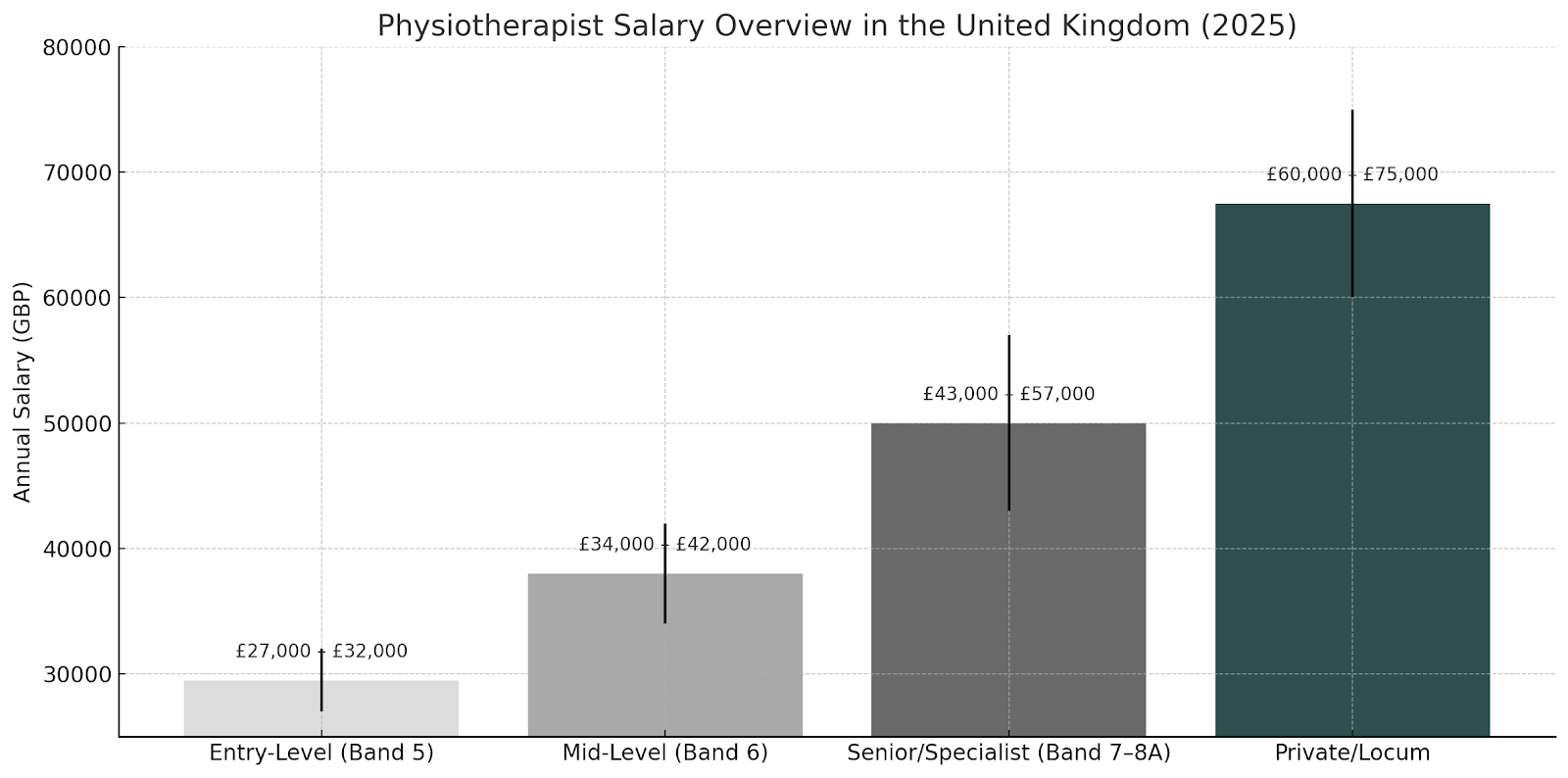
- Average pay: £27K(₹3,144,679) - 32K(₹3,727,027) annually (NHS Band 5 roles)
- Medium pay: £34K(₹3,959,966) - 42K (₹4,891,723)(NHS Band 6)
- High pay: £43K(₹5,008,192) - 57K (₹6,638,767)(Band 7 and 8A)
- Private Sector or Locum Roles: Can go up to £60K(₹6,988,176) - 75K(₹8,735,220)+, especially in London or with niche specialties like neuro or sports rehab.
Academically provides HCPC (Health and Care Professions Council) courses with expert guidance, AI-based mock tests, and more. Connect with our team of doctors and candidates to get the best possible guidance to be a registered Physiotherapist in the UK.
Comparison table of the top 10 countries for Physiotherapists
1. Average Salary (USD) – Physiotherapists
| Country | Avg Salary (USD) |
| Switzerland | $84K (₹7,192,316) – $96K (₹8,219,790) |
| USA | $97K (₹8,305,413) – $130K (₹11,130,966) |
| Norway | $85K (₹7,277,939) – $95K (₹8,134,167) |
| Australia | $75K (₹6,421,711) – $110K (₹9,418,509) |
| Denmark | $40K (₹3,424,912) – $65K (₹5,565,483) |
| Netherlands | $62K (₹5,308,614) – $108K (₹9,247,264) |
| Canada | $70K (₹5,993,597) – $100K (₹8,562,281) |
| New Zealand | $65K (₹5,565,483) – $110K (₹9,418,509) |
| Ireland | $55K (₹4,709,254) – $77K (₹6,592,956) |
| UK | $48K (₹4,109,895) – $68K (₹5,822,351) |
2. Top Earnings Potential
| Country | Top Earnings (USD) |
| Switzerland | $100K (₹8,562,281)+ |
| USA | $150K (₹12,843,422)+ |
| Norway | $100K (₹8,562,281)+ |
| Australia | $120K (₹10,274,737)+ |
| Denmark | $70K (₹5,993,597)+ |
| Netherlands | $130K (₹11,130,966)+ |
| Canada | $110K (₹9,418,509)+ |
| New Zealand | $120K (₹10,274,737)+ |
| Ireland | $80K (₹6,849,825)+ |
| UK | $75K (₹6,421,711)+ |
3. Average Work Hours Per Week
| Country | Work Hours (Weekly) |
| Switzerland | 36–42 hrs |
| USA | 40–50 hrs |
| Norway | 30–36 hrs |
| Australia | 38–40 hrs |
| Denmark | 38–42 hrs |
| Netherlands | 32–40 hrs |
| Canada | 36–40 hrs |
| New Zealand | 37–40 hrs |
| Ireland | 38–40 hrs |
| UK | 37.5 hrs |
4. Tax Burden
| Country | Tax Burden |
| Switzerland | Low |
| USA | Medium |
| Norway | Medium |
| Australia | Medium |
| Denmark | High |
| Netherlands | High |
| Canada | Medium |
| New Zealand | Medium |
| Ireland | High |
| UK | High |
5. Licensing Requirements
| Country | Licensing Needed? |
| Switzerland | Yes (SRK) |
| USA | Yes (NPTE) |
| Norway | Yes (HELFO) |
| Australia | Yes (APC) |
| Denmark | Yes |
| Netherlands | Yes |
| Canada | Yes (CAPR) |
| New Zealand | Yes (NZRB) |
| Ireland | Yes (CORU) |
| UK | Yes (HCPC) |
6. Language Barrier
| Country | Language Barrier |
| Switzerland | No |
| USA | No |
| Norway | Yes |
| Australia | No |
| Denmark | Yes |
| Netherlands | Yes |
| Canada | No |
| New Zealand | No |
| Ireland | No |
| UK | No |
7. Private Practice Potential
| Country | Private Potential |
| Switzerland | Very High |
| USA | Very High |
| Norway | High |
| Australia | High |
| Denmark | Moderate |
| Netherlands | High |
| Canada | High |
| New Zealand | Moderate |
| Ireland | Moderate |
| UK | Low–Moderate |
8. Cost of Living
| Country | Cost of Living |
| Switzerland | Very High |
| USA | High |
| Norway | High |
| Australia | Medium |
| Denmark | Medium |
| Netherlands | High |
| Canada | Medium |
| New Zealand | Medium |
| Ireland | Medium |
| UK | Medium |
9. Work–Life Balance
| Country | Work–Life Balance |
| Switzerland | Strong |
| USA | Varies |
| Norway | Excellent |
| Australia | Good |
| Denmark | Strong |
| Netherlands | Strong |
| Canada | Balanced |
| New Zealand | Balanced |
| Ireland | Balanced |
| UK | Moderate |
10. Visa-Friendliness
| Country | Visa-Friendly Info |
| Switzerland | Yes (EU/EFTA only) |
| USA | Yes (difficult) |
| Norway | Yes (non-EU hard) |
| Australia | Yes (Skilled visa) |
| Denmark | Yes (Blue Card) |
| Netherlands | Yes (EU OK) |
| Canada | Yes (Express Entry) |
| New Zealand | Yes (Skilled visa) |
| Ireland | Yes (Critical Skills) |
| UK | Yes (Health Worker visa) |
Conclusion
Academically, we specialize in helping physiotherapists such as you prepare for licensing examinations, understand country-specific registration routes, and get personal counseling on your career options abroad. Whether it is the APC process in Australia, HCPC registration for the UK, our team knows how to help you take them with confidence.
Note: The salary and global conversion are approximate and subject to changes.
